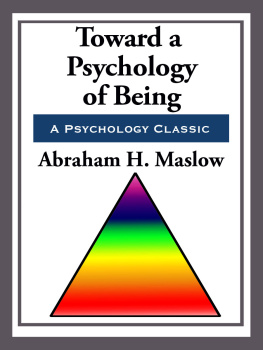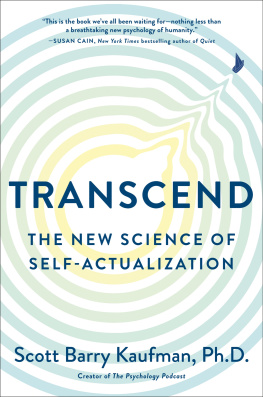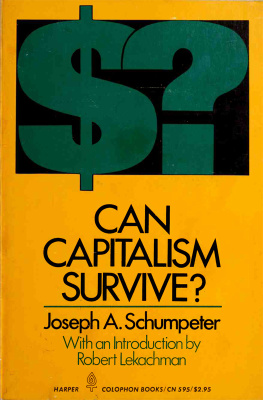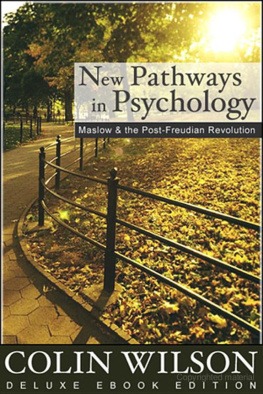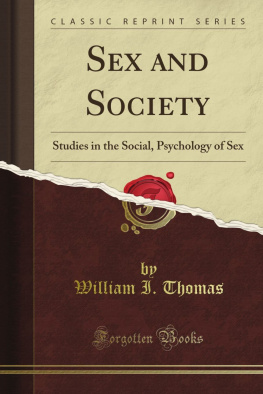Preface
I have had a great deal of trouble choosing a title for this book. The concept psychological health,though still necessary, has various intrinsic shortcomings for scientific purposes which are discussed at various appropriate places in the book. So also does psychological illnessas Szasz (160a) and the existential psychologists (110, 111) have recently stressed. We can still use these normative terms, and, as a matter of fact, for heuristic reasons we must use them at this time; and yet I am convinced that they will be obsolete within a decade.
A much better term is self actualizationas I have used it. It stresses full-humanness, the development of the biologically based nature of man, and therefore is (empirically) normative for the whole species rather than for particular times and places, i.e., it is less culturally relative. It conforms to biological destiny, rather than to historically-arbitrary, culturally-local value-models as the terms healthand illnessoften do. It also has empirical content and operational meaning.
However, besides being clumsy from a literary point of view, this term has proven to have the unforeseen shortcomings of appearing a) to imply selfishness rather than altruism, b) to slur the aspect of duty and of dedication to life tasks, c) to neglect the ties to other people and to society, and the dependence of individual fulfillment upon a good society,d) to neglect the demand-character of non-human reality, and its intrinsic fascination and interest, e) to neglect egolessness and self-transcendence, and f) to stress, by implication, activity rather than passivity or receptivity. This has turned out to be so in spite of my careful efforts to describe the empirical fact that self-actualizing people are altruistic, dedicated, self-transcending, social, etc. (97, Chapter 14).
The word selfseems to put people off, and my redefinitions and empirical description are often helpless before the powerful linguistic habit of identifying selfwith selfishand with pure autonomy. Also I have found to my dismay that some intelligent and capable psychologists (70, 134, 157a) persist in treating my empirical description of the characteristics of self-actualizing people as if I had arbitrarily invented these characteristics instead of discovering them.
Full-humannessseems to me to avoid some of these misunderstandings. And also human diminution or stuntingserves as a better substitute for illnessand even perhaps also for neurosis, psychosis, and psychopathy. At least these terms are more useful for general psychological and social theory if not for psychotherapeutic practice.
The terms Beingand Becomingas I use them throughout this book are even better, even though they are not yet widely enough used to serve as common coin. This is a pity because the Being-psychology is certainly very different from the Becoming-psychology and the deficiency-psychology, as we shall see. I am convinced that psychologists must move in this direction of reconciling the B-psychology with the D-psychology, i.e., the perfect with the imperfect, the ideal with the actual, the eupsychian with the extant, the timeless with the temporal, end-psychology with means-psychology.
This book is a continuation of my Motivation and Personality, published in 1954. It was constructed in about the same way, that is, by doing one piece at a time of the larger theoretical structure. It is a predecessor to work yet to be done toward the construction of a comprehensive, systematic and empirically based general psychology and philosophy which includes both the depths and the heights of human nature. The last chapter is to some extent a program for this future work, and serves as a bridge to it. It is a first attempt to integrate the health-and-growth psychologywith psychopathology and psychoanalytic dynamics, the dynamic with the holistic, Becoming with Being, good with evil, positive with negative. Phrased in another way, it is an effort to build on the general psychoanalytic base and on the scientific-positivistic base of experimental psychology, the Eupsychian, B-psychological and metamotivational superstructure which these two systems lack, going beyond their limits.
It is very difficult, I have found, to communicate to others my simultaneous respect for and impatience with these two comprehensive psychologies. So many people insist on being either pro-Freudian or anti-Freudian, pro-scientific-psychology or anti-scientific-psychology, etc. In my opinion all such loyalty-positions are silly. Our job is to integrate these various truths into the whole truth, which should be our only loyalty.
It is quite clear to me that scientific methods (broadly conceived) are our only ultimate ways of being sure that we do have truth. But here also it is too easy to misunderstand and to fall into a pro-science or anti-science dichotomy. I have already written on this subject (97, Chapters 1, 2, and 3). These are criticisms of orthodox, 19th Century scientism and I intend to continue with this enterprise, of enlarging the methods and the jurisdiction of science so as to make it more capable of taking up the tasks of the new, personal, experiential psychologies (104).
Science, as it is customarily conceived by the orthodox, is quite inadequate to these tasks. But I am certain that it need not limit itself to these orthodox ways. It need not abdicate from the problems of love, creativeness, value, beauty, imagination, ethics and joy, leaving these altogether to non-scientists,to poets, prophets, priests, dramatists, artists, or diplomats. All of these people may have wonderful insights, ask the questions that need to be asked, put forth challenging hypotheses, and may even be correct and true much of the time. But however sure they may be, they can never make mankind sure. They can convince only those who already agree with them, and a few more. Science is the only way we have of shoving truth down the reluctant throat. Only science can overcome characterological differences in seeing and believing. Only science can progress.
The fact remains however that it has come into a kind of dead end, and (in some of its forms) can be seen as a threat and a danger to mankind, or at least to the highest and noblest qualities and aspirations of mankind. Many sensitive people, especially artists, are afraid that science besmirches and depresses, that it tears things apart rather than integrating them, thereby killing rather than creating.
None of this I feel is necessary. All that is needed for science to be a help in positive human fulfillment is an enlarging and deepening of the conception of its nature, its goals and its methods.
I hope the reader will not feel this credo to be inconsistent with the rather literary and philosophical tone of this book and my previous one. At any rate, I dont. The broad sketching out of a general theory requires this kind of treatment, for the time being at least. Partly also it is due to the fact that most of the chapters in this book were prepared first as lectures.
This book, like my previous one, is full of affirmations which are based on pilot researches, bits of evidence, on personal observation, on theoretical deduction and on sheer hunch. These are generally phrased so that they can be proven true or false. That is, they are hypotheses, i.e., presented for testing rather than for final belief. They are also obviously relevant and pertinent, i.e., their possible correctness or incorrectness is important to other branches of psychology. They matter. They should therefore generate research and I expect they will. For these reasons, I consider this book to be in the realm of science, or pre-science, rather than of exhortation, or of personal philosophy, or literary expression.
A word about contemporary intellectual currents in psychology may help to locate this book in its proper place. The two comprehensive theories of human nature most influencing psychology until recently have been the Freudian and the experimental-positivistic-behavioristic. All other theories were less comprehensive and their adherents formed many splinter groups. In the last few years, however, these various groups have rapidly been coalescing into a third, increasingly comprehensive theory of human nature, into what might be called a Third Force. This group includes the Adlerians, Rankians, and Jungians, as well as all the neo-Freudians (or neo-Adlerians) and the post-Freudians (psychoanalytic ego-psychologists as well as writers like Marcuse, Wheelis, Marmor, Szasz, N. Brown, H. Lynd, and Schachtel, who are taking over from the Talmudic psychoanalysts). In addition, the influence of Kurt Goldstein and his organismic-psychology is steadily growing. So also is that of Gestalt therapy, of the Gestalt and Lewinian psychologists, of the general-semanticists, and of such personality-psychologists as G. Allport, G. Murphy, J. Moreno and H. A. Murray. A new and powerful influence is existential psychology and psychiatry. Dozens of other major contributors can be grouped as Self-psychologists, phenomenological psychologists, growth-psychologists, Rogerian psychologists, humanistic psychologists, and so on and so on and so on. A full list is impossible. A simpler way of grouping these is available in the five journals in which this group is most apt to publish, all relatively new. These are the

